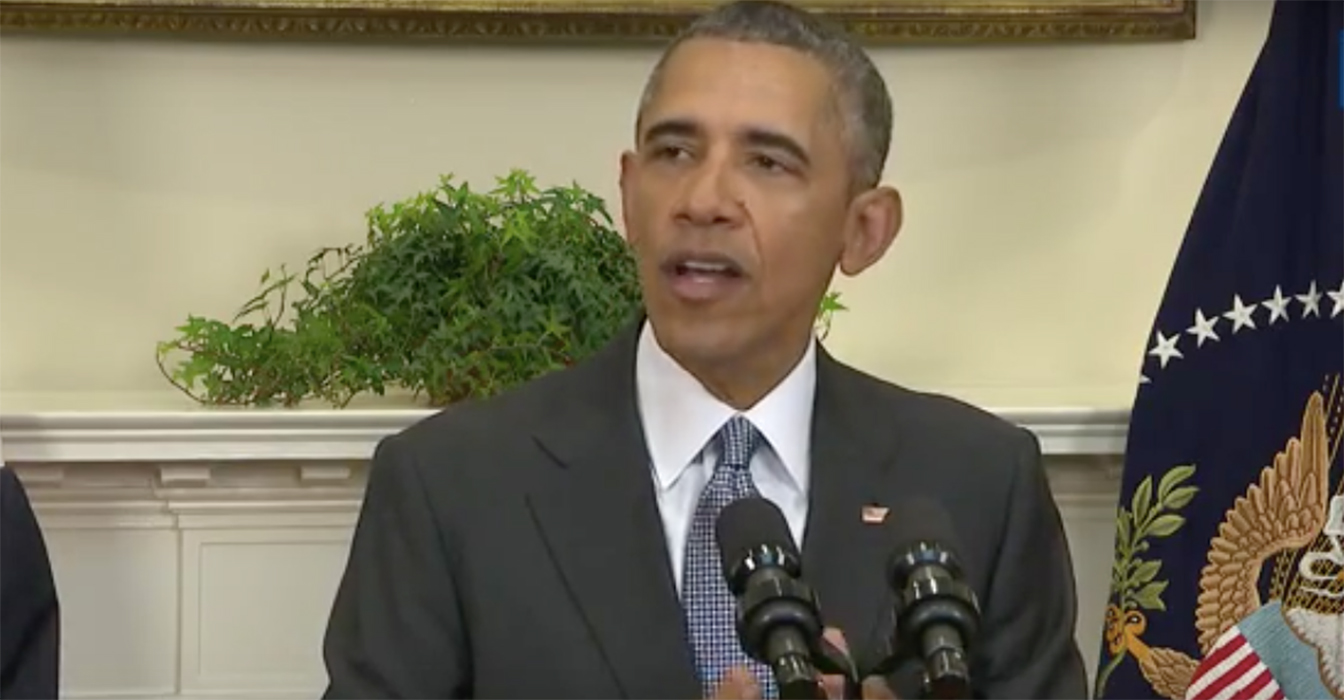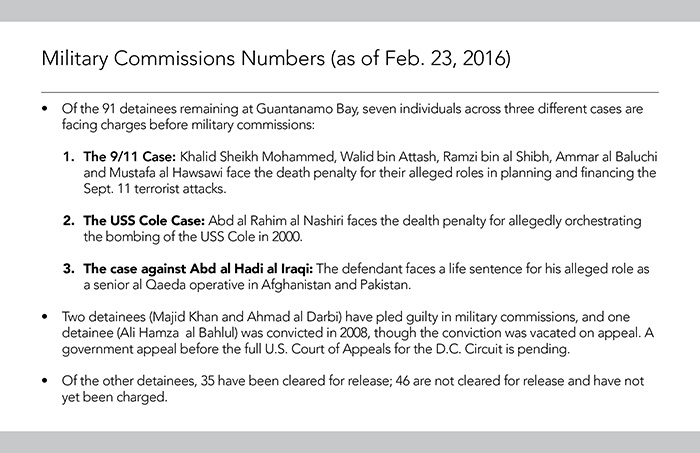Lawyers Debate CIA Evidence at Guantanamo as Obama Pushes to Close Site
By John Ryan | February 23, 2016 | News Articles, Guantanamo Bay, News & Features

On Tuesday, President Obama criticized the military commissions system he signed into law. (Video still from whitehouse.gov.)
Guantanamo Naval Base, Cuba – Prosecutors and defense attorneys in the Sept. 11 case resumed their heated debate on Tuesday about whether the government can withhold information about the five defendants’ past treatment at CIA black sites without any review by the judge, Army Col. James Pohl.
Discussion of redactions in a 2006 Justice Department Office of Legal Counsel memorandum to John Rizzo, then the acting general counsel of the CIA, about detainee treatment took up much of the morning. (The redacted memo has been in the public domain thanks to a Freedom of Information Act request.)
Defense attorneys contend that Pohl must compare the redacted and the original document to decide whether the defense should receive the complete version. James Connell, lead attorney for Ammar al Baluchi, told Pohl that the process was a “judicial act” and that his role was “front-loaded” in these disputes over access classified information.
But Army Brig. Gen. Mark Martins, the chief prosecutor, told Pohl that the government should not have to come up with an “itemized” list of every redaction in discoverable documents with an explanation for each blocked-out portion.
“That just can’t be the standard,” Martins said.
“That is exactly what it is,” David Nevin, the lead lawyer for Khalid Sheikh Mohammed, shot back.
The lead defender for Walid bin Attash, Cheryl Bormann, implored Pohl to review both sets of documents so that the issue could be properly considered on appeal. She acknowledged that the government gets "the first cut" on what should go to the defense.
"They don't get the final cut," she added. "You get the final cut." [Related: Browse recent military commissions coverage.]
The arguments played out in the Guantanamo Bay courtroom as President Obama presented his plan to Congress for closing the detention facility, which currently houses 91 detainees, including the five defendants charged with the Sept. 11 attacks and an additional five detainees subject to separate commission proceedings. Under the plan, the administration will work with Congress to find a location for the detainees in commissions as well as for other detainees not part of commissions who cannot be transferred.
In his remarks from the White House, Obama said the commissions “are very costly" and that "they have resulted in years of litigation without a resolution.” He added: “We’re therefore outlining additional changes to improve these commissions, which would require congressional action.”
The Sept. 11 defendants were arraigned in May 2012, following a failed attempt by the Justice Department to try them in New York federal court. While the prosecution will not provide an estimate, defense lawyers said late last year that the trial was at least five years away.
Discovery over the CIA’s Interrogation Program
Defense attorneys are seeking information about the CIA’s Rendition, Detention and Interrogation (RDI) program, which subjected their clients to “enhanced interrogation techniques” at agency black sites before their transfer to Guantanamo Bay in 2006.

The government has conceded that some of this information is material to the preparation of the defense, including efforts to challenge the admissibility of statements the defendants made at Guantanamo, to mitigate against the death penalty and to file motions to dismiss the charges based on outrageous government conduct. Last week, Martins pledged to provide ten different categories of information about the black sites, either directly to the defense lawyers or to Pohl.
Under commission rules and Brady v. Maryland principles, the government has to hand over helpful information to the defense. (Defense attorneys argued that the Brady standard covers all "favorable" information, not merely information that meets the higher standard of being "exculpatory." Martins did not adopt the "favorable" interpretation but allowed that the commission rule that deals with Brady principles "exceeds" an exculpatory standard.)
Commission rules also incorporate a D.C. Circuit decision from 1989 (U.S. v. Yunis) that require this information to be “noncumulative” if the government has invoked a national security privilege.
Martins told Pohl that the prosecution had the authority to determine what information is “cumulative” (or redundant) in situations where the government was going to be providing the same information in other discovery – a position rejected by the defense, which wants Pohl to make these determinations.
With the Office of Legal Counsel memos, Martins temporarily side-stepped the cumulative issue by telling Pohl that his team had decided that the blacked out portions were not relevant or helpful to the defense.
Still, defense lawyers charged that commission rules are clear that it is the judge who decides whether the defense can receive information that the government claims is privileged by national security. Suzanne Lachelier, one of the lawyers for Mustafa al Hawsawi, described the government’s position as “extra-judicial.”
James Harrington, the lead attorney for Ramzi bin al Shibh, echoed Nevin in arguing that the 8th Amendment required an expansive view of the Brady principle that the defense receive all favorable information. He said the standard in a death-penalty case could be interpreted as “Brady on drugs.”

